#myers briggs typology
Text
𝔱𝔥𝔢 𝔢𝔰𝔣𝔧 𝔞𝔯𝔠𝔥𝔢𝔱𝔶𝔭𝔢

↳ the sub-group archetype of the sentinels


ESFJ ⟶ extroverted feeling, introverted sensing, extroverted intuition and introverted thinking.
breaking down the archetype ⬎
♇ the archetype is made up of Fe Si Ne and Ti.
E = extroversion.
S = sensing.
F = feeling.
J = judging.
♇ the first two functions that determine the ESFJ TYPE CODE ⬎
Fe Si Ne Ti
♇ the Fe and Si within the ESFJ function makes up for the two missing letters in the middle of the type code: E _ _ J because the two missing letters in the middle are the first two functions!
♇ the Fe is the _ _ F _ because it is about extroverted feeling.
♇ the Si is the _ S _ _ because it is about introverted sensing.
-but what makes up the first letter in the code?
♇ what makes up for the first letter in the code is the second letter to the strongest function for the archetype. and the strongest function for ESTJ is Fe and evidently the second letter is “E” which causes the function to now become from _ S T _ to E S T _ .
♇ but what makes up the last letter in the code?
♇ you’ll have to look back at the first extroverted archetype in the entire code. and for ESFJ it is ⟶ Fe Si Ne Ti. the first extroverted function in the type is Fe, which is extroverted feeling.
♇ Fe belongs to the judging function which displays the fact that the last letter to E S T _ will be E S T J.
explaining the archetype ⬎
ESFJ's like to help other people, they can be considered to be forward with how they think and speak, and have a feasible and efficient way of doing stuff. they are people who are for the people! they are friendly, and like to be around friends and like to connect with others.
people could think of ESFJ's to be responsible, and since they like to be around people a lot, they can find themselves doing a lot of people-pleasing stuff since they like to be in harmony and peace, so they like to keep it that way. their friendly and tranquil energy can aid them to become popular. they work hard to maintain their connections with their friends, and they like it when its reciprocated.
they're idealistic people, but can be people who have a strong distaste towards critique. they are strong people with strong opinions and know what they want.
they could be people who like to be mediators, they like to learn everything they're intrigued by, and they're the type of people who remember random but vital facts. ESFJ's can be people who when they're advising other people, they like to base things on personal experiences.
they like to have things in order, and don't like feeling left out. they are people who like to be aware of their surroundings, like to read the room and be people who follow order.
ESFJ's are people who like to feel their emotions, and like to live in a world of harmony. they are usually the type of people who use their heart more than their head. they like to feel connected to the earth, to life, them being apart of something is what makes them move.
they can be considered to be people who are are friendly, aiding and supporting. as they're people who like to support, they take an interest in uniting other people and bringing out the best in them.
on the other hand, they can also be people who are emotionally chaotic, they dont like to be alone, the fear of being forgotten and unwanted is what they dislike the most. this can also make them very dramatic.
ESFJ'S AUXILIARY ⟶ SI. [AUXILIARY HELPS GROWTH/HEALTHY OR DEVELOPED ESFJ’S] ⬎
ESFJ's when developed are keen on details, but aren't obsessive about them, they are people who value proper traditional method, but when they feel like something is supposed to be changed, they wouldnt mind going for it.
they are people who aim for ambitious goals, and they can be considered as people who benefit from routines especially when they make sure they are not controlled by them.
ESFJ's when developed are able to handle discomfort, and whenever they go through obstacles they treat it as a learning challenge.
WHEN ESFJ’s BEHAVE INHIBITED ⬎
when ESFJ's act out of character, they can be very obsessive when itcomes to earning results, they can get too dependent on it.
they can be the type of people who over manage everything, being energy-draining perfectionists, nit-picking every detail that exists, especially commodities that go against expectations that are realistic.
they can also be people who obsessively enforces proper behaviour in other people. sometimes they cannot separate delusion and reality, and they can be the type of people who put on a mask and deny the negative, they're very rose coloured glasses people.
ESFJ's can be people who risk dangerous experiences to mask up their depressive state, and ESFJ's are the type of people to make up bad excuses whenever someone notices a flaw in them.
and whenever they dont want to feel disappointed, they lower their expectations and accept the bare minimum. but on the other hand they can be people who imagine worse case scenarios to avert advice that could be deemed good for them. this can make them suspicious with other people easily.
INFERIOR TI GRIP⬎
ESFJ's are the type of people who could feel lonely and disconnected from everything, and when they're confronted about ill behaviour they could sometimes feel like they're being cornered by everyone. they could be the type of people who are always confused, and paranoid about everything that breathes.
when low, they can be critical and dismissive about other people, and whenever they portray negative behaviour they always want to excuse themselves.
can become very addicted and obsessive people, and when they think there is a problem, they can become addicted to finding how to fix it. people from this archetype are the type of people who believe they're rational when it is totally the opposite.
could feel underlying feelings, specifically negative feelings which could push them into alienating themselves.

masterlist
get a paid chart reading link before i make the prices higher!
♇ pluto

#esfj#ashley graham#cedric diggory#barbie#barbie life in the dreamhouse#mbti#myers briggs typology#myers briggs#d4rkpluto#nicholas nelson#cassie howard#kevin keller#daphne bridgerton#will schuester
40 notes
·
View notes
Note
which things you dislike the most about each mbti personality type? what are the things you think should be improved of their natural tendencies?
Related answers:
1) welcome back! You were missed! 2) Do you think certain MBTI types are prone to certain problematic behaviors and 3) if so which ones really bother you or you dislike?
As an ENTJ what do you appreciate about the other MBTI types?
By perceiving function:
High Ne (ENFP, ENTP, INFP, INTP): Flaky and unreliable. Struggles with consistency, follow through, and discipline. Prone to being impractical and unrealistic. Quitters.
High Se (ESFP, ESTP, ISFP, ISTP): Short-sighted and superficial. Struggles with seeing the big picture and underlying connections. Prone to optimizing for short-term benefits over long-term gains. Reckless.
High Ni (INTJ, INFJ, ENTJ, ENFJ): Vague and unrealistic. Struggles with concrete details and constraints needed to make their ideas work. Prone to perfectionism and delusions of grandeur. Know-it-alls.
High Si (ISTJ, ISFJ, ESTJ, ESFJ): Concrete and rigid. Struggles with deviating from tried and true methods. Prone to dismissing novel ideas as unrealistic, annoying, and unwelcomed; risk averse to a fault. Killjoys.
By judging function:
High Fe (ESFJ, ENFJ, ISFJ, INFJ): Scripted and impersonal. Struggles with nuance, exceptions, and subjectivity to standard and expected behaviors ('social norms'). Prone to passive aggression and messiah complexes. Pushovers.
High Fi (INFP, ISFP, ENFP, ESFP): Subjective and rigid. Struggles with compromise and perceiving everything systematic as an attack on individuality, freedom, and creativity. Prone to martyr complexes. Victims.
High Te (ESTJ, ENTJ, ISTJ, INTJ): Systematic and impersonal. Struggles with nuance, exceptions, subjectivity to standard thinking ('common sense') and the unpredictable things that make humans-- human. Prone to impatience. Bulldozers.
High Ti (INTP, ISTP, ENTP, ESTP): Nuanced and chaotic. Struggles with creating scalable, standardized, and automated systems that work for the majority of people. Prone to overcomplicating everything. Trolls.
#mbti#myers briggs#infp#intj#intp#infj#enfp#entj#entp#enfj#istj#isfj#estj#esfj#istp#isfp#estp#esfp#mbtiq#typology
871 notes
·
View notes
Text
MBTI Color Palettes
Just color palettes I associate with each type. Just for fun.
INTJ

ENTJ

INTP

ENTP

INFJ

ENFJ

INFP

ENFP

ISTJ

ESTJ

ISFJ

ESFJ

ISTP

ESTP

ISFP

ESFP

___
MBTI notes
#mbti#colors#color palette#typology#cognitive functions#myers briggs type indicator#myers briggs#intj#entj#intp#entp#infj#enfj#infp#enfp#istj#estj#isfj#esfj#istp#estp#isfp#esfp
117 notes
·
View notes
Text
what Ni is NOT
a lot of people in the community get Ni wrong. and i totally get that because Ni is often talked about in a super vague, weirdly prophetic light. which it is NOT.
Ni does NOT mean you can’t make connections between ideas
Ni does NOT mean you only see one truth
Ni is NOT a predictive function
all Ni is, is intuition as it makes sense to you personally. Ne, looks at the outside data and expands on that, Ni looks at the outside data and puts it in their internal framework. that’s the only difference. that Ni is personal and Ne is less personal when dealing with the abstract.
the combination of Se and Ni can come across as Ne because the user takes the tangible details and then subconsciously adds them to their mental framework. the way i personally decide between Ne and Ni is often based on this, idea. that Ni tends to be a more subconscious process, often with the user struggling to explain where the conclusion came from. Ne tends to be an obvious process. i have never once had to question where an Ne user got their idea from, because they often talk through their process unknowingly.
but just because you can’t fully understand it does NOT make Ni a sort of prophetic function. never was and never will be. it’s just the process of boiling physical things into concepts and adding said concepts to a mental framework that only makes sense to that specific person.
#mbti#mbti types#infj#introverted intuition#intj#mbti infj#personality theory#cognitive functions#typology#carl jung#myers briggs
134 notes
·
View notes
Text
do u guys ever like discover ur type in another typology system and then just feel so cool and smart adding it into every bio u have like
"Hah oh yeah I'm a ILE ENTP (NeTi) [S]L/O/aI FEVL PBNV(4324) 7w8 739 sp/so sang-chol ph-phsa-ch "🧍🏾♀️
#typology#myers briggs#enneagram#four temperaments#entp#1w9#1w2#2w1#2w3#3w2#3w4#4w3#4w5#5w4#5w6#6w5#6w7#7w6#7w8#8w7#8w9#9w8#9w1#sanguine#choleric#phlegmatic#melancholic
471 notes
·
View notes
Text
hi it’s 6am and i can’t sleep so i typed every single headless character no i do not take criticism

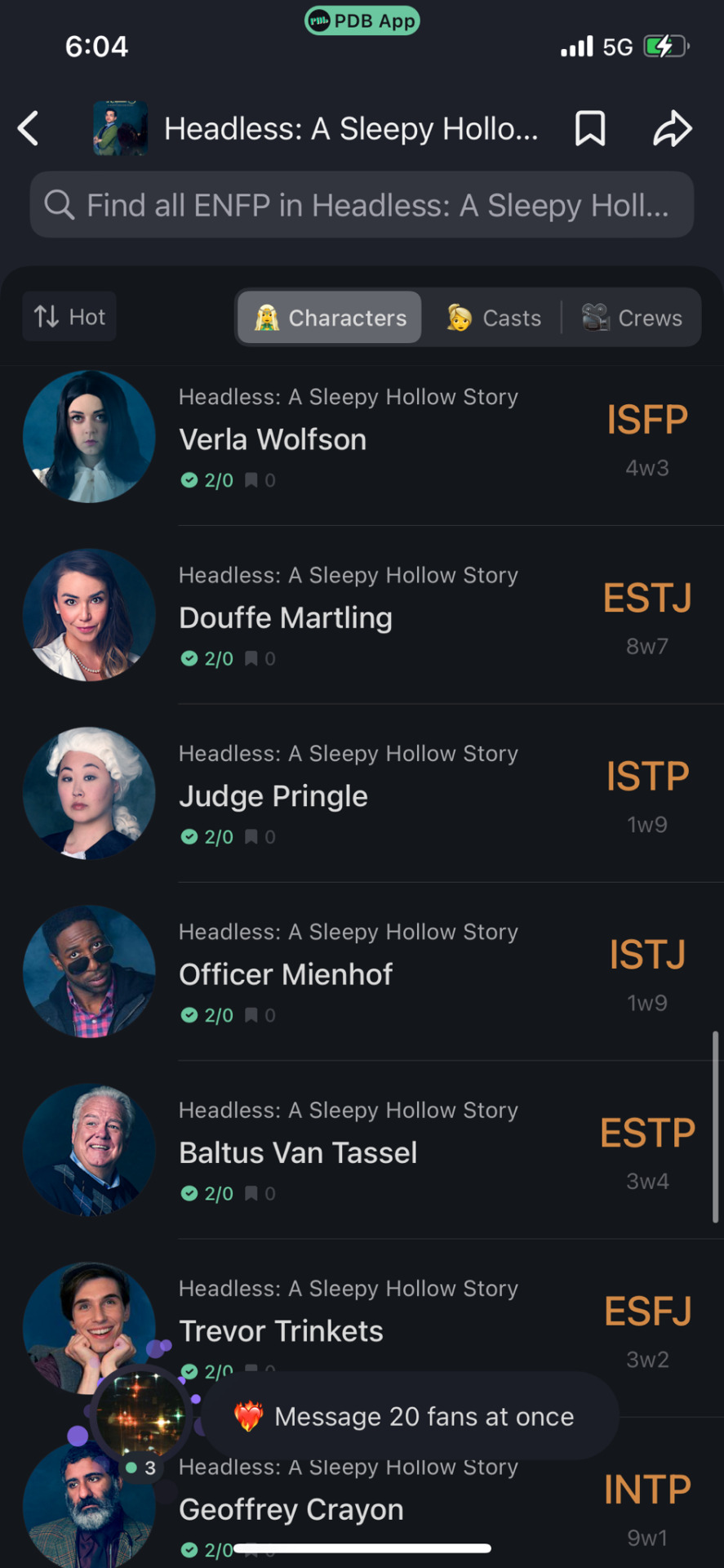
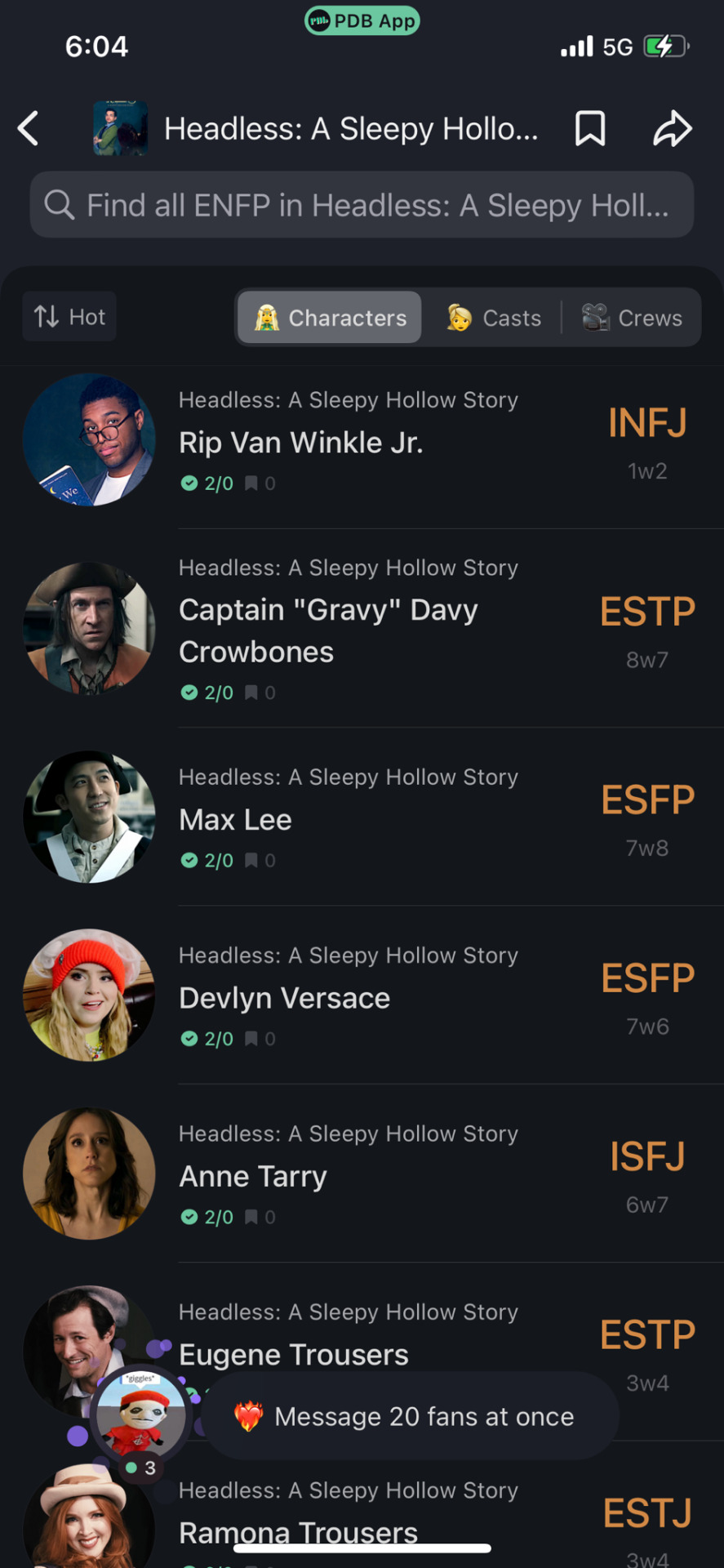
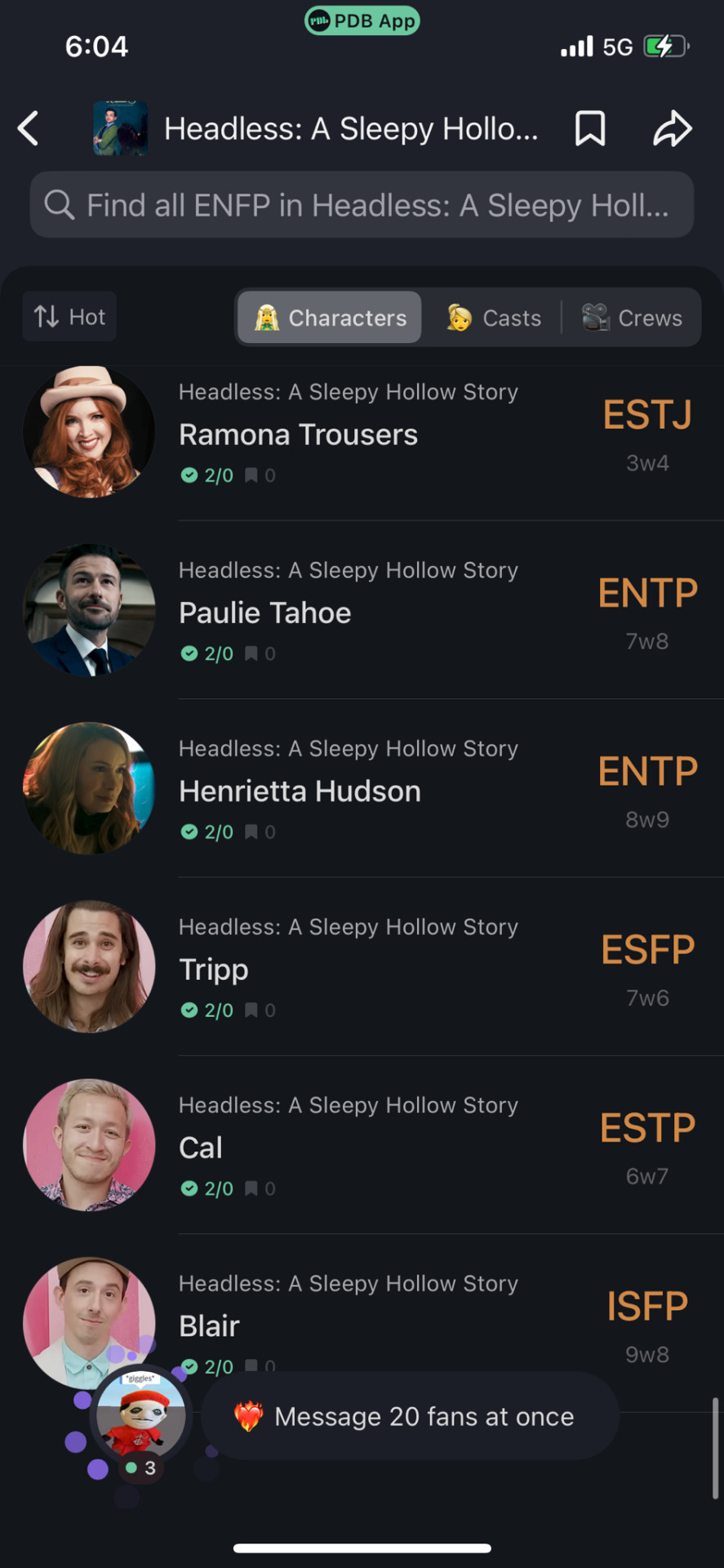
@shipwreckedcomedy u know im right
#headless a sleepy hollow story#shipwrecked comedy#jon cozart#enneagram#typology#personality database#pdb#myers briggs#mbti#16 personalities#cognitive functions#ichabod crane#diedrich knickerbocker#headless shipwrecked#youtube#kat von tassel#brom bones#shipwrecked
61 notes
·
View notes
Text
hot take, but i think classpects should be considered a valid personality typing system
#myers briggs enneagram AP etc. are all just pseudo-scientific#even if they can be extremely helpful for personal understanding and growth#but so can classpect if you take the time to investigate it and are enough of a 2010s internet nerd#so.#ramblings&such#typology#personality typology#classpect#homestuck
18 notes
·
View notes
Text





The Hunchback of Notre Dame - MBTI
This is my typing of each of the main characters, sans the gargoyles. I'm only going to discuss one of them in detail here, but I'll touch on each of the others as well.
Let's discuss what makes Phoebus such a healthy example of the ESTP.
Dominant Se: extroverted Sensing
Phoebus, as he's presented by Disney, just wants to live each day as it comes. He doesn't want to dwell on the past or stress about the future. He goes where he's called, thinking that wherever that is, adventure lies in store for him. His calm, collected, almost carefree demeanor makes one wonder if this man really has been at war for 20 years. Whether he has or not, he has learned through it all not to take a single day for granted. Sure, he can be impulsive and is just a little bit of a womanizer (moreso in the stage musical, but still far less so than in the book), but he knows how to keep these weaknesses in check and even use them as strengths. He's not as good of a flirt as he likes to think he is, but he stays humble enough to admit that. His Se is very well developed and shows all of its best strengths and qualities, tempered just enough by inferior Ni to keep Phoebus from jumping into everything without at least knowing and accepting the consequences.
Auxiliary Ti: introverted Thinking
This function is what gives Phoebus his skill as a strategist, a talent he's received numerous commendations for. Whenever he's presented with a new puzzle, he immediately goes to work breaking it down and analyzing each bit of it. His Ti also gives him a sharp wit, which keeps him cracking jokes. For a seasoned veteran, this is partly a coping mechanism, and partly a means by which he tries to relate to civilians in peacetime. But Phoebus is generally careful not to take it too far. His Ti is healthy, and is well tempered by tertiary Fe.
Tertiary Fe: extroverted Feeling
Phoebus' Fe is where his strength lies, and is the function that demonstrates the health of his personality type. He is in his early to mid 30s, so his Fe is at the peak of its development. It is the empathy function, seeking to relate to everyone around and tap into what they're feeling and experiencing. Phoebus displays a growth and maturity of this function in the right position at the right time that every ExTP should seek to emulate--quite the contrast to Clopin. Phoebus uses his Fe to key into what the other characters are feeling and is able to respond to them appropriately for the situation. This allows him to immediately respect Esmeralda as a person, for all that he admires her as a sexy young woman. He can remain stoic in the face of Frollo's flagrant admission to genocide, and knows the right moment to put his foot down. He stays in his position as long as he can with the clear intention of tempering Frollo's orders issued in rage, hoping to control some of the damage that Frollo is doing. But he also will not compromise when he sees others being put in immediate harm's way for Frollo's own ego. And he doesn't even consider his own safety or life when running into a burning building to rescue children, knowing full well he will probably be executed for saving such young lives.
Inferior Ni: introverted iNtuition
Phoebus is still a bit young yet to begin developing his Ni. But despite this, Ni doesn't seem to trip him up much, and it complements his Se well, even in this underdeveloped state. As mentioned above, Phoebus does not do much of anything without at least knowing what the consequences could be. Ni makes him accept them. It allows him to roll with them, and to change directions on a dime when need be. It gives him the focus necessary to see everything he does through to the end. No doubt that when Phoebus does start to develop this function in earnest, the end result will be a very wise and well rounded ESTP, who will be able to coach the next generation to become the best of themselves as well.
Leading with Se can make Phoebus appear shallow to those who don't know him well, and initially he is. But because of the strength of his other functions, Phoebus is capable of getting very deep. And the thing about the healthy ESTP is, once he goes deep, he never resurfaces. That's what gives this type its loyalty. And this is the type of loyalty we see in Phoebus. As far as fictional ESTPs go, Disney's Phoebus de Chateaupers is the single best example one can get.
Quasimodo - underdeveloped INFP
Because of Quasimodo's sheltered upbringing, he does not have much opportunity to develop his functions. He's 20 years old and should be working on his tertiary Si, but he's barely been allowed to even venture into exploring his Ne. However, despite being brought up by Disney's unhealthiest INFJ, Quasi has managed to develop a rather healthy Fi, making him an idealist. He's able to develop something of a sense of self and a defining moral center, and this allows him to connect with fellow Fi-dom Esmeralda. Quasi also has a very active imagination. If we consider the gargoyles figments of his imagination, this tells us that despite being isolated in the bell tower all his life, Quasi has still managed enough exposure to other personalities to be able to craft extremely fleshed out characters to reside in his paracosm. He can consider a multiverse of possibilities, and it gives him an idea of what he believes a perfect world would look like. His stunted Si will make adjusting to the outside world difficult, but at his age, his Te should be relatively unaffected.
Esmeralda - Blossoming ISFP
Like Quasimodo, Esmeralda is quite the idealist, with a solid moral core that she will not compromise on. Unlike Quasi, she has had time to discover who she is, and she is firm in her identity as a Romni, vocally proud of her heritage. She takes each day as it comes and doesn't consider a multitude of what-ifs the way Quasi and other Ne users do. Her outlook on life is shaped by her auxiliary Se. She doesn't worry about the past or the future because each day has enough trouble of its own. She is busy developing her Ni, which has her focused on rolling with the punches and using obstacles to her advantage. She serves as a nice foil to Phoebus' ESTP, bringing out the best traits in his type. And she offers solidarity for Quasi, who leads with Fi just as she does.
Clopin Trouillefou - ENTP caught in a loop
Clopin's age in the film is unknown, but considering he's the Rom baro (i.e. chief) of his community, there's no possible way he's younger than 35 (which is insanely young for a Rom baro) and little chance he's younger than 45 (which is still awfully young). So we have to assume that he is at an age where he should at least have started developing his inferior Si, the guiding function. But Clopin has a bit of a problem: He's looping between his dominant Ne and tertiary Fe, with his Ti being diminished to the point that he's capable of some very dumb things (not that we're letting Phoebus off the hook for falling for Frollo's ruse, but to be fair to him, he was suffering from blood loss and a concussion at the time). The Ne/Fe loop causes a person to tap into the toxic aspect of their empathy, feeding off of and reciprocating the negative emotions in the atmosphere, focusing on all the negative possibilities, and actively looking to suck all the energy out of others in a very unhealthy fashion for all parties. Clopin is in danger of becoming the Romani version of Frollo, albeit an extremely extroverted version. Letting his Ti become diminished is why Clopin foolishly takes all his guards off the entrance after capturing Phoebus and Quasimodo, which of course makes Frollo's work that much easier, allowing him to take the Court of Miracles without a fight. Hopefully with the pressure Frollo put on the Roma now gone, Clopin can claw his way out of that loop and start using his Ti and Si in a healthy manner again. He really is quite clever when he's a healthy ENTP.
Judge Claude Frollo - INFJ who should have gotten a grip, but ended up in one instead
Frollo had so much potential, and it all got shot to hellfire. As an INFJ, he had the rarest type, especially for men, and one of the most potent of all the types. His focus and empathy should've been bar none. He should've been the confidant; the compassionate priest he started out as in the novel. But early in his career, he allowed himself to slip into a loop between his Ni and Ti, and he never got out of it. He considered himself intellectually and spiritually superior to all around him, and could list out every last little reason why. And then Esmeralda came along and unwittingly plunged him into the grip of his inferior Se. He would've ended up there eventually, but Esmeralda is the one who sent him over the edge. Se is the sensory experience function, and at Frollo's age he should've already developed it in a healthy fashion that would allow it to temper his Ni. Normally, Se helps Ni remember the needs of the flesh--food, water, rest, relationships, etc. It acts as a reward system for Ni's focus and ambition. But when the Ni-dom is caught in the grip of Se, Se is taking revenge for being neglected for so long. Now it's all about the flesh. It's all about what Se wants right now. And you can't escape. Enjoy your guilt, Frollo, because Se is gonna pile it on as part of your punishment.
#the Hunchback of Notre Dame#MBTI#Myers-Briggs Type Indicator#ESTP#Phoebus#INFP#Quasimodo#ISFP#Esmeralda#ENTP#Clopin Trouillefou#INFJ#Judge Claude Frollo#analysis#typology#cognitive functions
24 notes
·
View notes
Text
Basic Cognitive Functions Guide
As an MBTI enthusiast, I like making little guides and notes to help me visualize and process information, so here ya go!
Two Attitudes
Extroverted (E): Functions oriented towards the real world—views things as is without personal alignment and filtering. "Breadth."
Introverted (I): Functions oriented towards the subject's world—views things through personal alignment and filtering. "Depth."
Two Categories
*Judging
Judging Function (Jx): Reason—a cause, explanation, or justification for an action or event—used to judge and decide.
Extraverted Judging (Je): Reasoning based on external effects. Looks at what should be.
Introverted Judging (Ji): Reasoning based on internal alignment. Looks at personalized principles.
*Perceiving
Perceiving Function (Px): Processes used in gathering or filtering information.
Extraverted Perceiving (Pe): Perceiving based on external exploration. Unfiltered gathering of information.
Introverted Perceiving (Pi): Perceiving based on internal narrowing down. Filtering information.
Four Aspects
*Inter/personal ("emotional"): Human-based matters.
*Impersonal ("logical"): Nonhuman-based matters.
Feeling Functions (Fx): Judgment metrics oriented towards people and inter/personal matters. Emotional reasoning.
Thinking Functions (Tx): Judgment metrics oriented towards things and impersonal matters. Logical reasoning.
Intuition Functions (Nx): Perceiving processes oriented towards intangible information. Abstract perception.
Sensing Functions (Sx): Perceiving processes oriented towards tangible information. Concrete perception.
Eight Cognitive Functions (putting it all together)
*Judging Functions:
Extraverted Feeling (Fe): Reasoning based on external inter/personal effects—emotional consequences. "What should be valued."
Extraverted Thinking (Te): Reasoning based on external impersonal effects—logical consequences. "What should work."
Introverted Feeling (Fi): Reasoning based on internal inter/personal alignment—emotional particularities. "What feels right to me."
Introverted Thinking (Ti): Reasoning based on internal impersonal alignment—logical particularities. "What makes sense to me."
*Perceiving Functions
Extraverted Sensing (Se): Perceiving based on external concrete exploration—unfiltered gathering of tangible information. "What is."
Extraverted Intuition (Ne): Perceiving based on external abstract exploration—unfiltered gathering of intangible information. "What if."
Introverted Sensing (Si): Perceiving based on internal concrete narrowing down—filtering tangible information. "What has been."
Introverted Intuition (Ni): Perceiving based on internal abstract narrowing down—filtering intangible information. "What will be."
I made this based on my understanding of Psychological Types by Carl Jung. Click here if you'd like to view the guide in a different format and see the direct quotes i used from Jung's book.
#mbti#carl jung#cognitive functions#myers briggs#fe#te#ti#fi#se#ne#si#ni#guide#typology#16 personalities#jungian theory#op
243 notes
·
View notes
Text
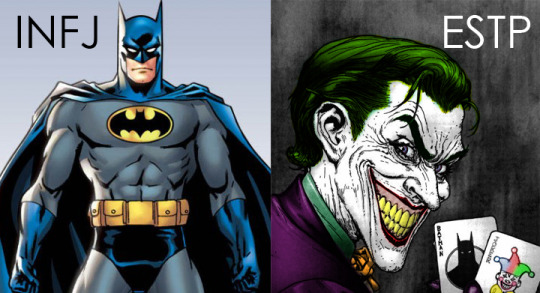
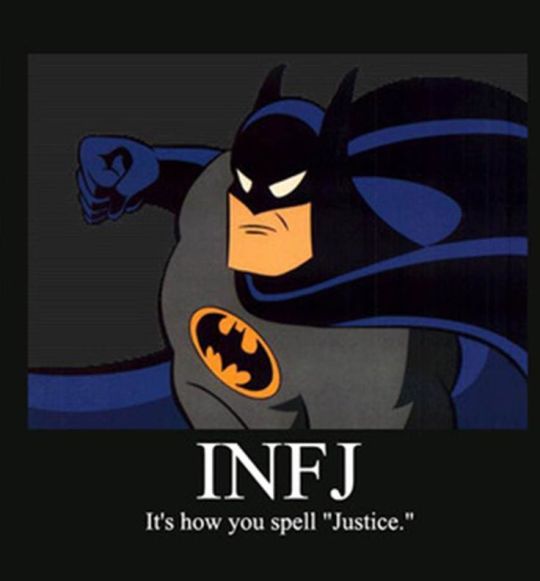

This is obviously a very controversial topic, as it always is with typing a fictional character, but being an INFJ myself and a big fan of the Bat, I liked how the two could be linked together. If you don't agree with this typing is okay, I don't really care and neither should you. I'm just posting because I liked it!!
Forgot who I got the text from, or I'd tag them, but I think it came from reddit.
Batman is an INFJ. He’s often confused for an INTJ, but those that believe that either don’t understand INFJs or they don’t understand Batman. Granted there is overlap between INTJs and INFJs, so the confusion is understandable. Also, one must take into consideration the inconsistencies in the depiction of the character throughout his long history. Nonetheless, a well-written Batman is one that has a lot of feelings. INFJ males are the rarest combination in the world. It makes sense; Batman truly is one of a kind.
INFJs feel deeper than other personality types. They don’t heal well. Think about how many superheros have lost their parents. Superman. Barry Allen. The list goes on and on. None react to those deaths the way that Batman reacted to his parents dying. It destroyed him. He never got over it. He felt that pain so deeply in a way that only an INFJ would understand. Batman didn’t become a superhero because he has super powers. He used that pain from his parents’ death as the impetus for becoming a superhero. To be clear, it wasn’t LOGIC that drove him to become the Bat, it was FEELING. And few people are capable of feeling to the depths that INFJs can. INFJs are notorious brooders. So is Batman. You can’t brood if you’re not emotional.
INFJs feel an enormous amount of responsibility for the world’s problems. They suffer from a massive savior complex. Coupled with that complex comes an insane amount of guilt. The guilt and responsibility that Batman feels is overwhelming in his comic book history. Look at his relationship with Harvey Dent/Two Face. The amount of guilt he feels for not being able to save his friend is one of the key themes regarding that character. Batman feels so much guilt for not being able to save his parents, for not being able to save Jason Todd, and countless others. These experiences haunt him. He wants so desperately wants to reform criminals (for example Selina Kyle). Look at the compassion he has offered Mr. Freeze, Clayface, and countless others. He wants to save them. He wants to help them. Read the comics. You will find countless examples of him trying to reform and help the people he fights against. One could write a whole book on that topic alone.
INFJs see the world not as it is but as it could be. And they are crazy enough to do something about it. They are dreamers, but unlike most dreamers, they act.
INFJs are intense. They take on the problems of the world and carry that on their shoulders. They are self-sacrificing; willing to give up everything for the greater good, including relationships and their own life. He’s willing to be the bad guy if need be if it gets the job done. He takes on everyone’s burdens.
INFJs are capable of so much compassion, their ability to feel empathy is a key characteristic. This characteristic people always get wrong about the Batman character. People view him as cold and unfeeling (more about this later), but they’re wrong. Batman has so much compassion. Look at all of the kids he has adopted or taken under his wing: Dick, Jason, Tim, Stephanie, Barbara. The list goes on and on. He’s like the Angelina Jolie of the DC universe! Look at the way he counsels Superman regarding his relationship with Superboy. Again, note how desperately he tries to reform people. He believes that people change. He has faith. He’s an optimist in so many more ways than we give him credit. That being said, INFJs don’t always make the best mentors. They are perfectionists that have insanely high expectations for themselves and anyone they care about. This constant pushing for more can backfire on the INFJ in a mentorship position and make the relationships with their mentees a bit rocky.
When INFJs become stressed they revert to their tertiary function. In many ways they become what looks like an unbalanced ESTP (their opposite). They become very much about the present. This means indulging in sensory type behaviors: sex, food, exercise or physical fighting. I’ve seen some arguments that Batman can’t be an INFJ because he goes around punching people.
But INFJs can be very physical and carnal when angry, stressed, or off balanced. The INFJ that doesn’t adequately deal with the overflow of emotions can be explosive with their anger.
When an INFJ is too overwhelmed with feelings or the weight of their responsibilities, they can actually turn off their compassion or empathy and become very cold, unfeeling, and judgmental. It’s a defense mechanism to deal with the insane amount of feelings trapped in their bodies.
INFJs have a dark side that is terrifying. Google INFJ dark side to understand what I am talking about. INFJs are passionate about their causes, but always have to be careful about going too far; about falling into that abyss. Thus the endless brooding.
INFJs make excellent actors (it’s often a proposed career choice) because of their ability to understand other people. They are adaptable and can play many characters. Bruce Wayne is a good example of this ability. He pretends to be the extrovert, the playboy, the rich brat. But its not who he is; it’s a mask. The Batman is his true form.
INFJs run by their own moral code. They make their decisions ultimately using their powerful intuition or gut feeling. Batman follows his hunches. And he’s usually right. That’s what makes him such a great detective. INFJs love logic. They use it all the time. But unlike INTJs, logic is only a useful tool for INFJs, it’s never the end all factor in making split decisions. They use their gut for that. They are also master manipulators and interrogators because they understand people in a way few others can.
The list goes on and on, but I think I will stop for now. Like I said, Batman has not always been written consistently over the last 80 years of his existence, so there may be versions of the character that you could argue is an INTJ. But the vast majority of representations of the character in the comics and animated series displays a very well developed INFJ.
Final note—I’ve always been fascinated by the relationship between Batman and the Joker. Two sides to the same coin. Truly the inverse of the other. The Joker is indisputably an ESTP. I don’t think anyone argues otherwise (he’s definitely NOT an ESFP). ESTPs love chaos and breaking rules. The idea that Batman and the Joker are mirror opposites of each other is poignant. I feel it describes them so well, all the more reason why a well written Batman is an INFJ.
#project batman#batman#bruce wayne#martial arts#training#exercise#fitness#infj#batman infj#intuitive#introverted#feeler#judger#mbti#myers briggs#myers briggs type indicator#psychology#typology#fictional characters#fictional characters typology#possibly autistic#possibly aspergers
10 notes
·
View notes
Text
𝔢𝔵𝔭𝔩𝔞𝔦𝔫𝔦𝔫𝔤 𝔱𝔥𝔢 𝔪𝔶𝔢𝔯𝔰-𝔟𝔯𝔦𝔤𝔤𝔰 𝔱𝔶𝔭𝔬𝔩𝔬𝔤𝔶 𝔦𝔫𝔡𝔦𝔠𝔞𝔱𝔬𝔯

don't be surprised that me someone who is obsessed with archetypes is posting about mbti...but please buckle up for the post because it's a handful, and i'll make the post as easy as possible to understand!
♇ if you just want to support here is my paypal!

♇ anyways, [i'll be using sentences that i've learned as well] the mbti is used to understand yourself, the relationships your in along with your personal growth; the mbti is about your cognition which means your intelligence, how you process and understand information.
♇ people need to understand that the typology cannot predict how someone is going to consciously behave, for example, someone sees an intj and the first thing they think is that "omg that person is definitely going to be so emo".
♇ however, the mbti does predict the subconscious micro-expression [which means someone's true emotion] and body language. keep in mind, anyone can change behaviour, so yes, mbti's can change depending on the personal growth of someone, someone's mbti might fully form when they're like a middle aged adult, in my opinion.
♇ the mbti typology believes that we understand information in two ways, which are functions called ⬎
the judging and perceiving functions.

♇ the perceiving function ⟶ understanding information that is experienced first handedly by the person, and putting the information together afterwards.
♇ the judging function ⟶ understanding information without having to experience it first handedly, and putting the information together afterwards or even the same time they come in contact with the information.
♇ everyone judges information by a logical and a rational mindset, along with value based and a honest criteria which is involved with the four modes of cognition [intelligence] everyone has.
↳ and those four modes are:
♇ sensing, intuition, thinking or feeling, which can either be introverted or extroverted. every type has four of the functions [sensing, intuition, thinking or feeling] in descending order, meaning from strongest to weakest. which also refers to how much someone uses four of the functions they have; and the plethora of the descending combinations gives rise to the 16 types.

♇ let's begin with the perceiving functions ⬎
which include SE, SI, NE AND NI.
SE ⟶ extroverted sensing.
SI ⟶ introverted sensing.
NE ⟶ extroverted intuition.
NI ⟶ introverted intuition.

♇ beginning with the sensory functions [SE AND SI].
⟶ with SE which is the extroverted sensing.
⟶ extroverted sensing [SE] react to events first handedly, [like their own experience], before they believe or understand in something.
⟶ they see things as it is and don't overthink the answer in front of them. for example, they're the type to look at a maths question and think that all "solutions/problem solving" can lead to the same answer.
⟶ people with extroverted sensing are action-oriented and need to experience things themselves in order to understand it, like i have mentioned before.
⟶ onto with SI which is introverted sensing.
⟶ introverted sensing [SI] react to events as patterns they have seen before, for example, if someone has already seen two individuals who belong to loud and violent houses react to situations in a defensive way, and the [SI] individual meets another person who has the same background as the other two people they have communicated before and notice that the new individual behaves the same way. they'll understand that people from abusive households are normally protective over themselves out of trauma.
⟶ [SI] individuals build personal associations to data, they'll look at something like "this solution is bad" and "this solution is good" because of the outcomes they have seen or heard before; which is different than a [SE] native, who would rather want to interact with the solution before they come up with an answer. [SI] people who are selective and consistent; they only want information that is useful for them.
⟶ they're people who go by previous examples, and are likely people who can identify patterns in large source of information, and dont need first hand experience to know when something is true.

♇ now with the intuition functions [NE AND NI]
⟶ starting with NE which is extroverted intuition.
⟶ extroverted intuition [NE] are people who see countless of possibilities with their intuition, every probability or likelihood they see they will take it into account. they're the "anything is possible" group.
⟶ [NE] individuals see possible connections, which causes their work to grow more bigger and bigger as they're expansive people, like [SE], [NE] natives have no specific preferences they'd like to work on, and find every idea useful. these natives tend to be very action-oriented as well.
⟶ they are people who need to first handedly go through situations for them to make the dots/connections; which could sometimes not give them the upper hand when they're trying to solve something compared to an [SI] who will already make the patterns due to events they have read or heard before.
⟶ now onto NI which is introverted intuition.
⟶ introverted intuition [NI] are people who could be perceived as people who arent as expressive to situations openly, but will feel a lot on the inside. they're the type of people to form a logical concept from information that is relevant or they think is relevant.
⟶ like [SI] the [NI] individuals only see information or patterns that makes sense to them and and they do care about other people's thoughts and additional information within their research.
⟶ they're specific and are likely to understand things easily while finding further links and connections. they're reflective about the information they gather, so when they do receive details, they'll see if it makes sense or not.

⟶ people can either have SE & NI or SI & NE; it can never be "i have SE & SI or i have NI & NI".
information about perceiving functions finished.

♇ moving onto judging functions.
which includes TE, TI, FE AND FI. ⬎
TE ⟶ extroverted thinking.
TI ⟶ introverted thinking.
FE ⟶ extroverted feeling.
FI ⟶ introverted feeling.

♇ beginning with the thinking functions [TE AND TI]
⟶ with TE which is extroverted thinking
⟶ they're people who most likely focus on their own judgement, they will decide what makes sense to them and what doesnt make sense to them; what is logical and what is not, which will normally be based on their own experiences with the issue. they're focused on the end product, so they'll likely do the same thing to see if the outcome changes.
⟶ they think of ideas that are effective, and are objective to the route they're taking, they're people who like information that can be proven to them. if they can't see it, they wont believe it. it's their basic understanding of logic.
⟶ [TE] individuals can be considered as quite annoying because they normally don't listen until they have to go through a specific situation all the time/or go through much life lessons to understand what to or not to do.
⟶ with TI which is introverted thinking
⟶ [TI] individuals like to make everything make sense to them, which could be time consuming because for example, they would like to learn something so simple, will learn it, but during the process they would want to know every step, even the irrelevant steps which makes it time consuming.
⟶ they can only go forward in life when they do understand something, they're people who are likely to be anxious when they dont know information they think is relevant to them, compared to [TE] natives who wouldnt mind learning the details when they're going through a route.
⟶ [TI] people are considered less impactive than [TE] folks as they're people who only want to learn the depth of a topic and not other possibilities that can surround the topic.

⟶ onto FE which is extroverted feeling
⟶ [FE] natives judge on what they see on the outside, for example they're the type of people to judge people based on their appearance or based on their first impressions compared to other functions. they wouldnt really be like "oh i just need to know the depth of this person" if someone presents themselves as rude, the [FE] person will always think of the other person as insolent, no redemption.
⟶ people who have [FE] are usually those who are mainly like "it can only either be these two options" nothing else. they're normally like that when they experience something physically first and if their mind thinks something is negative they will always perceive that thing is negative while deeming the opposite thing of that instrument positive.
⟶ they're people who are clear about their intentions so other people can understand what they are striving for. could sometimes lead to them failing since people will always know what they're up to.
⟶ onto FI which is introverted feeling
⟶ [FI] people judge the weight of something after they deeply understand the matter. and when they understand the deepness to an information they decide what part of the information is useful for them.
⟶ like the [TI] system, [FI] is very specific and particular about everything, like they cant just go on with life knowing 2+2 equals 4, they'll need to understand why 2+2 equals 4.
⟶ evidently, they're people who take the time to understand something which can sometimes take it longer for them to understand a subject compared to other people but when they finally understand it, they become very efficient to the subject and find ways to simplify it for other people so everyone else can learn.
⟶ people can either have TE & FI or TI & FE; it can never be "i have TE & TI or i have FI & FE".
⟶ information about the judging function finished.

⟶ TWO THINKING AXIS ⬎
♇ SE AND NI ⟶ see the issue and would like to explore different possibilities of it or live through it.
♇ SI AND NE ⟶ see the issue and would rather focus on that single issue before they apply it to other things.
TWO JUDGING AXIS
♇ TE AND FI ⟶ see the problem and would solve it with how other people might've solved it before, but would solve the problem with multiple tools they'll think that can work on the issue.
♇ TI AND FE ⟶ see the problem and would rather solve it with a tool that might've worked in other scenarios. wouldnt think to use other tools if they know the one they have right now is useful.

SO...WHAT MAKES AN MBTI...AN MBTI?
♇ the order of the functions i have mentioned: SE, SI, NE AND NI that belong to the thinking functions and TE, TI, FE AND FI that belong to the judging functions make the mbti!
♇ including what function is the strongest to what function is the weakest.

♇ the axis pairs will either be the first and fourth function or the second and third function.
⟶ SE AND NI being function pairs.
⟶ SI AND NE being function pairs.
⟶ TE AND FI being function pairs.
⟶ TI AND FE being function pairs.

♇ for example, let's use ISTP ⬎
⟶ I = introversion.
⟶ S = sensing.
⟶ T = thinking.
⟶ P = perceiving.
↳ the first two functions determine the middle letters of the MBTI TYPE CODE.
♇ the functions within the ISTP TYPE CODE
⟶ TI SE NI FE ⬎
♇ the TI AND SE within the ISTP function make up for the two missing middle letters in the type code: I _ _ P because they are the first two functions!
⟶ because TI is the _ _ T _ in ISTP because it is about introverted thinking.
⟶ and SE is the _ S _ _ in ISTP because it is about the extroverted sensing.

"but pluto what makes up for the first letter in the code?"
♇ good question! what makes up for the first letter in the code is the second letter in the strongest function and the strongest function for ISTP is TI and what is the second letter for TI? It's "I" which causes the function to now become from _ S T P to I S T P.
♇ if the TI was a TE it would commence the function to become E S T P.

"okay but what about the last letter in a type code?"
♇ you'll have to look back at the first extroverted function in the type code for your mbti, and for ISTP it is ⟶ TI SE NI FE. the first extroverted function in the type code is SE which means EXTROVERTED SENSING.
♇ SE belongs to the perceiving function which implies that the last letter for I S T _ will be I S T P.
♇ if the SE was replaced and FE was the first extroverted function for the type code, the type would have changed from I S T P to I S T J. because FE belongs to the judging function!

↳ lets use an extroverted mbti now.
⟶ E = extroversion.
⟶ N = intuition.
⟶ F = feeling.
⟶ J = judging.
♇ the functions within ENFJ TYPE CODE are ⬎
⟶ FE NI NE TI ⬎
♇ the FE AND NI within the ENFJ function make up for the two missing middle letters in the type code: E _ _ J because they are the first two functions!
⟶ because FE is the _ _ F _ in ENFJ because it is about extroverted feeling.
⟶ and NI is the _ N _ _ in ENFJ because it is about the introverted sensing.

"but pluto what makes up for the first letter in the code?"
♇ good question! what makes up for the first letter in the code is the second letter in the strongest function and the strongest function for ENFJ is FE and what is the second letter for FE? It's "E" which causes the function to now become from _ N F J to E N F J.
♇ if the FE was a FI it would commence the function to become I N F J.

"okay but what about the last letter in a type code?"
♇ you'll have to look back at the first extroverted function in the type code for your mbti, and for ENFJ it is ⟶ FE SI NE TI. the first extroverted function in the type code is FE which means EXTROVERTED FEELING.
♇ FE belongs to the judging function which implies that the last letter for E N F _ will be E N F J.
♇ if the FE was replaced and NE was the first extroverted function for the type code, the type could have changed from ENFJ to ENFP. because NE belongs to the perceiving function!

♇ i hope this helped you guys understand how the myers briggs typology works even more! this is just me opening up before i post about the mbtis!
♇ if you just want to support here is my paypal!
♇ masterlist

pluto
♇
#d4rkpluto#mbti#extroverted sensing#introverted sensing#extroverted thinking#introverted thinking#extroverted intuition#introverted intuition#extroverted feeling#introverted feeling#myers briggs#pluto#ISTP#ENFJ#myers briggs typology#myers briggs typology indicator
332 notes
·
View notes
Text
INFP-A Personality: Know them Better!
1. Comfortable Being Themselves
The assertive nature of the assertive mediator is something that makes it seem very different from its turbulent mediator relative. Unlike the turbulent mediators who are likely to beat themselves up from mistakes and flaws, the assertive mediators are far more likely to accept and even embrace their flaws.
The assertive personality is one that is comfortable being themselves and is not as caught up in the opinions of others. When paired with a mediation type, this assertive personality means that this person will be able to take in the opinions of others while not being critical about their meanings.
2. Look on the Brighter Side
The mediation personality is one that is primarily framed with an idealistic vision and sense of the better things in life. Mediators are people that believe that things are inherently good so that they can see things in a better light. Paired with the assertive personality trait, that feeling can become even stronger.
Assertive personality types are ones that see things as good more often than they see things as being bad. This combines with the idealism of the mediation personality to create a mix of both positive forward-thinking and a feeling that everything will be okay.
3. Discount Their Mistakes
Whether you see it as a good or a bad thing, the assertive mediator is very quick to dismiss their flaws and mistakes after they are noticed. This comes from the idea that they do not want the negative thoughts to take up time or space in their heads. The assertive mediator would rather think about ways to get better than to dwell on negative emotions.
An assertive mediator is going to be far more likely to look for ways to better themselves and their flaws than to get caught up in them and just feel bad. It is personality traits like these that allow this type of person to take things less seriously so that they can get on with growth and improvement.
4. Consider More Positive Thoughts
While it is still normal and common for assertive mediators to apply labels to themselves, they do so with substantially less weight than the turbulent mediators would. For example, if an assertive mediator deemed themselves “boring” and a turbulent mediator did the same, the turbulent mediators would take it much more to heart than the assertive mediator.
It is said that the assertive mediator sees life through “rose-tinted lenses” because they are often looking to see the best side of things. This optimistic attitude helps them to think better of themselves as well as to see others as better people.
5. Express Self-Assurance
The turbulent mediator’s personality, as we have seen, can face some serious struggles when faced with stressful situations, but the assertive mediator seems to be the exact opposite. The sense of optimism and self-assurance that everything will be alright helps drive the assertive mediator to achieve their goals.
Despite the benefits of having a heightened sense of inner confidence, this can also come back to hurt assertive mediators if they are not careful. Not taking the time to address more serious issues as they arise can have those issues compound and get worse if not addressed.
6. Great at Encouraging a Group
Something that helps the assertive mediators to lead groups effectively is their sense of confidence in themselves and in others. They do what they want, the way they want to, and very little is going to get in their way to stop them from achieving their goals.
An assertive mediator can stand before a group and share their vision without caring about the negativity or alternate viewpoints that go against their vision. This ability to take charge and get a group to a final goal is something in which the assertive trait helps greatly.
7. May Not Be Great at Conveying Desired Outcomes
Despite being good at leading groups to a goal, everything in between is often where the assertive mediators can have some rough patches. Leading a team requires playing to the strengths and weaknesses of a team so that the job gets done. This is not always easy for the assertive mediator.
Since they believe highly in the abilities of others and value their work, the assertive mediator can struggle to outline concrete goals and aspirations to a team. They can get the group eager to work, but they may not always provide the clearest direction.
8. Don’t Outwardly Express Many Emotions
The ability of the assertive mediator to simply brush off the comments of others is both a blessing and a curse. While they can get over some rude or insulting comments, they also find it harder to outwardly express their emotions due to a more subdued desire for the approval of others.
This can make the assertive mediator appear cold, as they are not searching for anyone’s compliments or praise in a relationship.
9. Live with Less Regret
Mediators, in general, are a category of personalities that are known for their ability to keep learning throughout their entire lives. This can have negative consequences on the turbulent traits as it leaves them feeling a sense of regret. For the assertive, however, their continued learning just leaves them with more confidence.
The ability to not get too caught up in their own failures and pitfalls allows assertive personalities the freedom to not feel much regret.
10. Have Quieter Behavior
Even though the assertive mediator would seem like someone who would be very outgoing and one to share their ideas, they are actually rather reserved. Their quieter behavior means that it is often hard to get to know these kinds of people because they are less likely to expose their emotions and inner feelings.
Assertive mediators are perfectly content with being themselves, and that allows them to be just fine with not having many people with whom to talk.
11. Comfortable Being with Themselves
One of the standout features of the assertive mediator is that they really don’t need to value how others see them. This often-sighted freedom from judgment allows them to be themselves openly as they know that the opinions others have of them hold little weight.
Compared to the turbulent mediator, the assertive mediator is going to be very open to who they are and what they stand for.
12. Don’t Take Criticism Seriously
Branching off the idea that they are very open about themselves, assertive mediators are not going to really take criticism to heart. They will listen to what others have to say and criticisms of them, but they are not very likely to change anything. This is often a good way to preserve themselves, but it can lead to arrogance.
13. Hesitate to Ask for Help
Even when they need it the most, the assertive mediator may appear stubborn as they fail to reach out for the needed help. This is not a healthy trait, as it is entirely human to reach out and ask for help when it is needed the most. Assertive mediators are very good at brushing off opinions, but they are just as hesitant to accept help.
Conclusion
Who would have thought that two small variations in a larger personality would have so many differences between them. We see the turbulent mediator look inward and remain reserved and the assertive mediators speak their minds and live without regret. Understanding how each of these personalities lives and acts will give you the power to better understand yourself and work better with others in every interaction going forward.
#INFP#INFP-A#INFP A#MBTI#Comparison#strength#myers briggs#typology#candy writings#9w1#4w5#enneagram#correlation
6 notes
·
View notes
Text
A view of each MBTI type by an INTJ:
Saw a few of these lately so why not? Lol
___
INTJ: My type and the best type obviously. Kidding. Not really. Healthy/mature ones are interesting and helpful, nice and easy to talk to. I've noticed immature ones try a little too hard to seem edgy and cool to fit into the "cold" INTJ stereotype when that's not a flex at all. I think a lot of us are impatient and stubborn too.
ENTJ: Often driven and motivated individuals who put in a lot of effort into what they do. I admire their hardworking nature. I've unfortunately come across a very unhealthy one before who was quite possessive and narcissistic. I did not have to deal with them personally, but a few of my friends did and their horror stories of that ENTJ will probably be stuck with me forever.
INTP: Their minds are...unique. I wonder what goes on in there. Such weird yet interesting individuals. Sometimes a bit rude, unintentional or not. My younger sister is one and I have to resist the urge to fight with her a lot lmao, but maybe that's just us being siblings.
ENTP: Love them. ENxPs in general 🤌🤌. I've never come across a boring ENTP. Often so chaotic. Never fail to make me laugh. I can have the funnest conversations with them. So witty.
INFJ: One of my best friends is one and it's kinda funny how similar yet different we both are. Ni dom things I guess. Other INFJs I've observed seem to have a lot of patience and kindness. Genuinely have a good heart and want the best for others.
ENFJ: I've only met two personally. Can be funny and witty, really approachable people. Both are very loyal and care a lot about their families, they carry a lot of responsibilities for others. Do not like to show their struggles, will probably mention it briefly before changing the subject.
INFP: Probably my least favorite type due to having bad experiences with them. Unhealthy ones can be so whiney and pathetic. Always want to cry and complain but never actually do anything about it. Can burst emotionally without warning. They can be so exhausting to deal with. I'm not gonna automatically hate you if you're an INFP though, that's just stupid lol, but I will be wary. I only have one INFP friend for now and likely because she's a lot older than me, she's much calmer and more considerate compared to the previous INFPs I've encountered.
ENFP: Some weirdos fr but I love it. Always so talkative and excited. Why are you guys lowkey kinda sad though 😭
ISTJ: I haven't come across any irl yet, but a few of my favorite fictional characters are ISTJs. One of my fav kpop idols as well. Not really sure where the boring stereotype comes from as I think ISTJs are quite nice.
ESTJ: I don't think I've met any yet and have typed a few idols as an ESTJ. I know they get a bad rep, but I honestly just think it stems from ESTJ's tendency to be direct, no bs, which can be intimidating/overwhelming for people. They can be really weird and silly only if they're comfortable.
ISFJ: I don't know any ISFJs irl, but seeing ISFJ idols/celebrities, they're just usually nice and kind people. Quiet but do enjoy being with others.
ESFJ: Honestly think my other best friend may be one 🤔 I do think she has a high Fe for sure. They seem to care the most about their presentation and other's opinions of them.
ISTP: I've only met one and they were okay. Pretty chill and had immense "idgaf" energy. But that attitude was also what made them a bit unlikeable as it extended to having a disregard for feelings and morals. Nobody's perfect, but I don't think it's that difficult to have common human decency. I do like a few ISTP characters and celebrities though.
ESTP: One of my older siblings is one and we get along fine. She has a good eye for aesthetics. Her and other ESTPs I've seen don't really seem to be super serious people, they're just trying their best to enjoy life. Adventurous and open minded. Can't seem to stay still.
ISFP: Have only met a few irl and I've also typed several kpop idols as one. From what I've seen, they are a lot calmer compared to INFPs. They're quite passionate but more realistic individuals though, always going for what they want (likely due to aux Se). Also quite blunt lol but it does not top IxTP's honesty.
ESFP: Have not met any irl yet, but from observing an ESFP I follow and ESFP celebrities, I like their straightforwardness. Passionate and expressive. Funny.
#mbti#typology#cognitive functions#myers briggs type indicator#myers briggs#enneagram#intj#entj#intp#entp#infj#enfj#infp#enfp#istj#estj#isfj#esfj#istp#estp#isfp#esfp#i may or may not have a slight grudge against infps jk#my ennea 3 jumped out with the intj note whoops
227 notes
·
View notes
Note
Hi Mr ENTJ! Of all the people in your circle, who is the least similar to you and what mbti are they? Or are you generally the person who looks for people who find similar personality (behaviorally not cognitively)?
Other than successful and loyal, what other qualified that you look for in a friend?
They're INFPs.
I have a ton of INFP friends who are very different from me. Their thought process, priorities, careers, and life choices couldn't be more different but we're still friends because we have shared values, similar interests, and complementary behaviors. The thing that makes them great friends is 1) the ease in which I can speak to them openly and honestly 2) the value in getting a perspective from a type that's completely opposite to me and 3) the absolute trust in their discretion. They're pretty much non-judgmental lockboxes of blunt honesty once you've cracked their secret friendship code.
The more comprehensive answer is here.
It's generally more difficult for me to build strong bonds with Ti and Fe users (xxTPs and xxFJs) with the exception of ISTPs because regular communication requires more effort and common behaviors require more explanation. It's easier for me to have misunderstandings with xxFJs than any of the other MBTI types because what I meant and what they interpreted can be lost in translation: first come the assumptions, then the hurt feelings, then the emotional xxFJ dissertation length text messages™, and finally the awkward reconciliation. It's more difficult, but it's not impossible, and it's been a gap worth bridging to build some of the most valuable relationships in my life. [Related: What do you appreciate about the other types?]
#mbti#infp#enfp#intj#entj#istp#myers briggs#typology#personality#personality type#friendship#faq#mbtiq
26 notes
·
View notes
Text
Te users: thats a nice argument senator, why don't you back it up with a source?
Ti users: my source is that i made it the fuck up
41 notes
·
View notes
Text
the world if i were entj instead of entp
3 notes
·
View notes